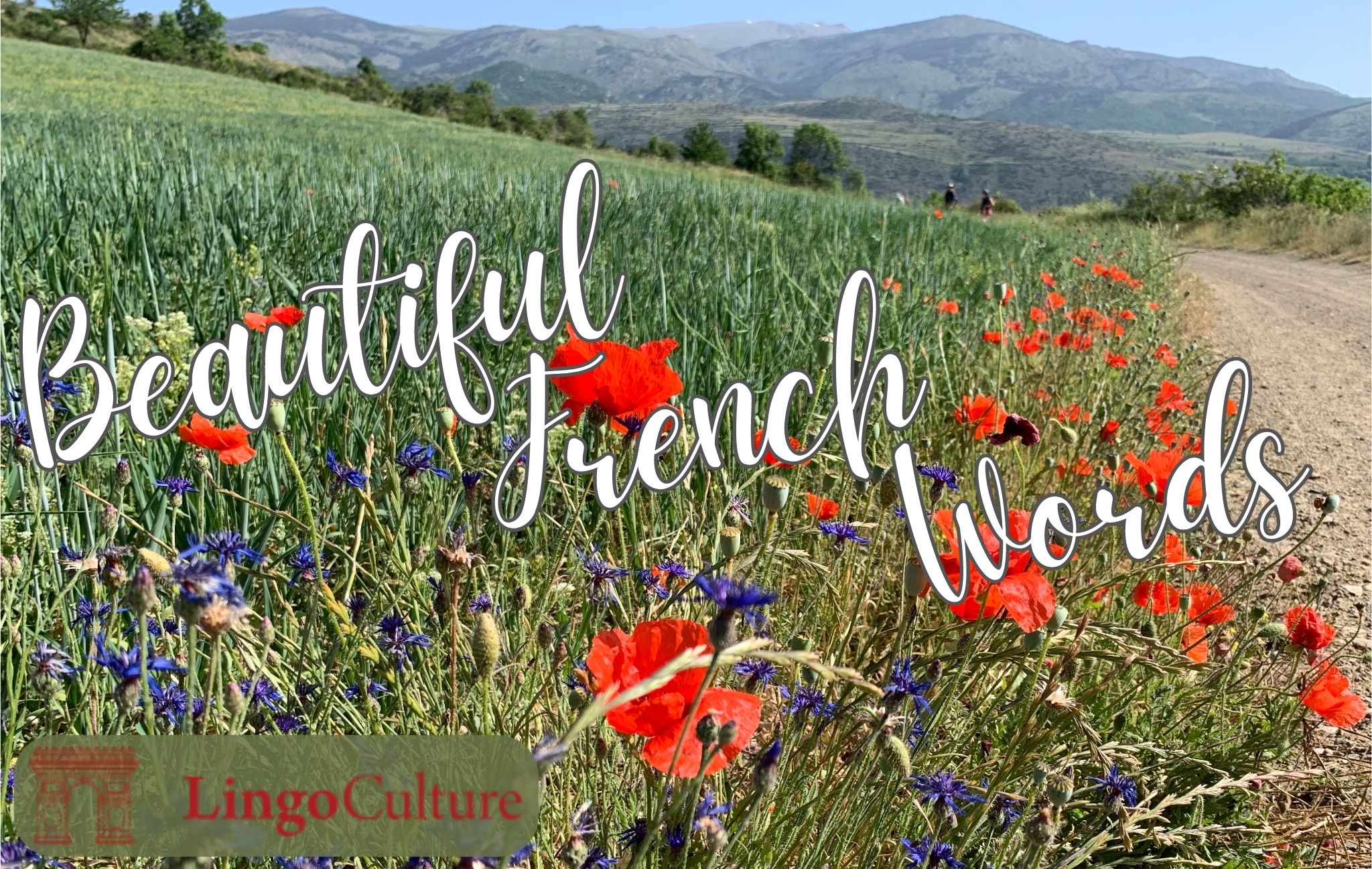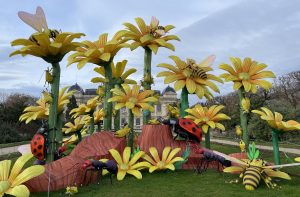Beautiful French Words: From “Amour” to “Poésie”

Get our free email course, Shortcut to Conversational.
Have conversations faster, understand people when they speak fast, and other tested tips to learn faster.
More infoAre you among the many English speakers who find that French is a beautiful language? We couldn’t agree more!
The idea of beautiful French words may be based partially on cultural assumptions about the French people and French culture, whether from films, music, or personal interactions. We get it. Really, how can we resist such lovely French words sung by icons like Brigitte Bardot or Vanessa Paradis?
But what about the language itself? Indeed, French is widely considered one of the most beautiful languages in the world, known for its melodious rhythm, intricate vocabulary, and expressive intonation. Here at LingoCulture, we sure find spoken French beautiful, with pronunciation among the core strengths of our learners.
To show you what we mean, we asked some of our teachers for a few of their favorite French words, based not only on how the words sound to the ears but also the thoughts they evoke. In this post, we’re glad to present some of the most beautiful French words that they came up with!

This post is presented by LingoCulture, the number one way to learn French online.
LingoCulture students get access to unlimited 1-on-1 French classes with 50+ native teachers via video chat for $197/mo. Click here to start your 7-day trial for $1 today.
This has been a particularly fun post to write, with ample room for artistic interpretation. In contrast to our usual LingoCulture posts on French grammar or vocab, this one’s all about the beauty of language. It’s our pleasure to share 25 of the most beautiful French words with you!
Amour
We can’t help but start with this ubiquitous French word, meaning “love.” The central “m” sound gives it a sense of deliciousness, while the drawn-out “ou” sound, pronounced by pursing the lips like a kiss, really enunciates the visceral feeling of the concept. “Amour” is definitely one of the most beautiful French words!
Douceur
Douceur means “softness,” “sweetness,” or “gentleness,” and its soft, flowing sound perfectly captures the tender, affectionate nature of the sentiment. The word’s open vowels and flowing consonants lend it a sense of warmth and ease.
Chuchoter
This word means “to whisper,” and its gentle, hushed sound is reminiscent of the soft, secretive quality of the act. The repeated “sh” sounds add to the word’s intimate, hushed effect, while the final aspirated “t” sound reminds us that even whispers are meant to be heard.
Murmure
“Une murmure” is “a murmur” or “a whisper.” The understated sound of the word, expressed mostly with the mouth entirely closed, perfectly conveys its quiet and confidential nature.
Merveille
“Une merveille” is “a marvel” or “a wonder,” evoking thoughts of amazement and discovery. The musical, flowing sound of the word belies the enchanting and mesmerizing nature of the feeling. Its adjective versions, meaning “marvelous,” are equally beautiful French words: “merveilleux” and “merveilleuse.”

L’eau du lac scintille de manière éclatante. Quelle merveille !
Scintiller
“Scintiller” means “to sparkle” or “glitter,” and its bright, shimmering sound is reminiscent of the dazzling and radiant nature of the notion, like late-afternoon sun reflecting across innumerable ripples on a mountain lake.
Éclatant
“Éclatant” means “brilliant” or “dazzling,” and its bright, explosive sound strikes us with the intensity and energy of what it describes. The word’s curt final syllable lends it a sense of sharpness and clarity, making it a particularly dynamic word to hear.
Éblouissant
This word means “dazzling” or “blinding,” and its bright, sparkling sound perfectly captures the intensity and brilliance of the experience. The multiple vowels in its adjective form underline the shocking effect, like if we were to say “she was dazzled” – “elle était éblouïe,” further confirming the pertinence of the beautiful French word “éblouissant” for such encounters.
Épanouissement
This word means “blooming” or “flourishing,” while it also connotes personal growth and development with a sense of “inner satisfaction.” The word’s flowing syllables and soft, open vowels evoke a sense of unfolding and expansion.
Émeraude
This word means “emerald,” and its rich, jewel-like sound perfectly captures the deep, vivid green of the gemstone. The word’s flowing syllables and musical consonants lend it a sense of opulence and luxury, while its final “‑aude” is almost captivating.

Les brindilles délicates tapissent le sentier
Brindille
This word means “twig,” and its delicate, slender sound is reminiscent of the thin and delicate nature of the object. Reflecting a certain fragility, whether underfoot on the forest floor or catching the first sparks of a campfire, the open-ended second syllable of “brindille” reminds us of its impermanence.
Micocoulier
The “micocoulier,” known in English as the “hackberry,” is a beautiful tree found in parks, gardens, and town squares all over France, especially in Provence, with small berries favored by songbirds. The word itself is a pleasure to say, with its first and final vowel sounds inciting a smile, punctuated by a kissing shape of the mouth for the middle syllables, while the repeated “c” sounds are reminiscent of our calming words to babies. As it rolls of the tongue, “micocoulier” thus evokes idyllic French landscapes as iconic as the language itself.
Coquelicot
This word means “poppy,” and its delicate, flowing sound perfectly captures the light, airy quality of the flower. The word’s repeated “c” sounds lend it a sense of movement and energy, making it a particularly fun word to say and hear.
Coccinelle
“Coccinelle” means “ladybug,” and the word’s delicate, musical sound does justice to the small, bright, and cheerful nature of these little creatures. The word’s repeated “c” sounds lend it a light, playful quality, while the final “‑elle” gives it gentleness.
Papillon
“Papillon” means “butterfly,” and its delicate, fluttery sound perfectly captures the grace and lightness of these colorful insects. The word’s repeated “p” sounds followed by a quick “on” ending lend it a lilting, musical quality.

Fleurs, abeilles, et coccinelles à l’honneur au Jardin des Plantes
Fleur
This word simply means “flower,” and its soft, flowing sound is as lovely as the object itself. So simple yet so delicate, the “-eur” in “fleur” can be drawn out as long as we want, to evoke colorful petals fluttering in a light breeze.
Serendipité
This word means “serendipity,” or the unexpected discovery of something valuable or delightful. The word’s flowing syllables and musical intonation capture the joyful surprise and pleasure of such a discovery. The word’s repeated vowel sounds lend it a sense of harmony and balance, while the quick repetition of consonants makes it a particularly fun word to say.
Sérénité
“Sérénité” means “serenity” or “peacefulness,” and its flowing, peaceful sound captures the calming and tranquil nature of the sentiment. Even the spelling of “sérénité” merits inclusion on our list of beautiful French words, with the series of accents swooping over the word from start to end.
Nostalgie
“Nostalgie” means “nostalgia,” and its soft, wistful sound evokes the sentimental and melancholic nature of the feeling. “Nostalgie” can carry a certain weight as we look to the past, so this word’s open “-gie” ending may even help us draw out our thoughts as we reflect.
Mélancolie
“Mélancolie” means “melancholy,” or even “sadness,” and its flowing, mournful sound captures the deep, introspective nature of the emotion. The word’s repeated “l” and “n” sounds lend it a sense of deep feeling and contemplation, making it a particularly evocative word encouraging reflection.

Le papillon se pose avec délicatesse sur les fleurs
Délicatesse
“Délicatesse” means “sensitivity,” and its soft, gentle sound conveys the fragile and refined nature of the concept. It’s a particularly beautiful French word to describe delicate acts, whether figurative like quietly calming a distraught child, or tangible like adding decorations to a cupcake.
Tendresse
Tendresse means both “tenderness” and “affection,” so its soft, flowing sound is particularly suited to the gentle and loving nature of the sentiment. The word can even sound provocative with the right pronunciation, as we roll the middle “-dre-” like a purring cat, and finish off with a trailing “-esse.”
Tranquille
“Tranquille” means “tranquil” or “calm,” and the word’s gentle, soothing sound fits perfectly with its serene and peaceful notion. The second syllable can be particularly drawn-out, allowing our voice to tone down to silence as we pronounce “-quille.”

La poésie partout: “Love is like emotional quicksand”
Rêverie
“Rêverie” means “daydream” or “reverie,” and its soft, dreamy sound evokes the imaginative and contemplative nature of the concept. “Rêverie” can be a state of mind, whether momentary or as a lifestyle, so simply hearing this beautiful French word allows us to float through the clouds even if only for a moment.
Poésie
“Poésie” means “poetry,” and its gentle, musical sound reflects the artistic and expressive nature of the literary form. We’ve chosen this as the final example in our list of beautiful French words here since this entire post has enabled some degree of “poésie” as we’ve described them all to you.
We hope you enjoyed reading, pronouncing, and pondering all of these beautiful French words as much as we enjoyed creating this post for you!


